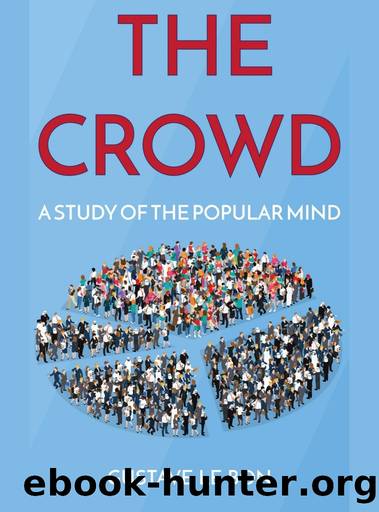The Crowd: A Study of the Popular Mind by Gustave le Bon

Author:Gustave le Bon [Bon, Gustave le]
Language: eng
Format: azw3
Tags: Psychology, Nonfiction
ISBN: 9780486122083
Publisher: Dover Publications
Published: 2002-01-08T00:00:00+00:00
Chapter III. ãThe Leaders of Crowds and Their Means of Persuasion.
We are now acquainted with the mental constitution of crowds, and we also know what are the motives capable of making an impression on their mind. It remains to investigate how these motives may be set in action, and by whom they may usefully be turned to practical account.
1. ãThe Leaders of Crowds.
As soon as a certain number of living beings are gathered together, whether they be animals or men, they place themselves instinctively under the authority of a chief.
In the case of human crowds the chief is often nothing more than a ringleader or agitator, but as such he plays a considerable part. His will is the nucleus around which the opinions of the crowd are grouped and attain to identity. He constitutes the first element towards the organisation of heterogeneous crowds, and paves the way for their organisation in sects; in the meantime he directs them. A crowd is a servile flock that is incapable of ever doing without a master.
The leader has most often started as one of the led. He has himself been hypnotised by the idea, whose apostle he has since become. It has taken possession of him to such a degree that everything outside it vanishes, and that every contrary opinion appears to him an error or a superstition. An example in point is Robespierre, hypnotised by the philosophical ideas of Rousseau, and employing the methods of the Inquisition to propagate them.
The leaders we speak of are more frequently men of action than thinkers. They are not gifted with keen foresight, nor could they be, as this quality generally conduces to doubt and inactivity. They are especially recruited from the ranks of those morbidly nervous, excitable, half-deranged persons who are bordering on madness. However absurd may be the idea they uphold or the goal they pursue, their convictions are so strong that all reasoning is lost upon them. Contempt and persecution do not affect them, or only serve to excite them the more. They sacrifice their personal interest, their family â everything. The very instinct of self-preservation is entirely obliterated in them, and so much so that often the only recompense they solicit is that of martyrdom. The intensity of their faith gives great power of suggestion to their words. The multitude is always ready to listen to the strong-willed man, who knows how to impose himself upon it. Men gathered in a crowd lose all force of will, and turn instinctively to the person who possesses the quality they lack.
Nations have never lacked leaders, but all of the latter have by no means been animated by those strong convictions proper to apostles. These leaders are often subtle rhetoricians, seeking only their own personal interest, and endeavouring to persuade by flattering base instincts. The influence they can assert in this manner may be very great, but it is always ephemeral. The men of ardent convictions who have stirred the soul of crowds, the Peter
Download
This site does not store any files on its server. We only index and link to content provided by other sites. Please contact the content providers to delete copyright contents if any and email us, we'll remove relevant links or contents immediately.
| Anthropology | Archaeology |
| Philosophy | Politics & Government |
| Social Sciences | Sociology |
| Women's Studies |
The Leavers by Lisa Ko(6472)
Born to Run: by Christopher McDougall(6259)
iGen by Jean M. Twenge(4702)
Sapiens by Yuval Noah Harari(4535)
The Kite Runner by Khaled Hosseini(4430)
Spare by Prince Harry The Duke of Sussex(4195)
Bullshit Jobs by David Graeber(3179)
Livewired by David Eagleman(3121)
Goodbye Paradise(2961)
Never by Ken Follett(2879)
A Dictionary of Sociology by Unknown(2517)
Harry Potter 4 - Harry Potter and The Goblet of Fire by J.K.Rowling(2416)
The Club by A.L. Brooks(2358)
People of the Earth: An Introduction to World Prehistory by Dr. Brian Fagan & Nadia Durrani(2346)
The Social Psychology of Inequality by Unknown(2309)
Machine Learning at Scale with H2O by Gregory Keys | David Whiting(2287)
Harry Potter and the Order of the Phoenix (5) by J.K. Rowling(2226)
0041152001443424520 .pdf by Unknown(2219)
Don't Sleep, There Are Snakes by Daniel L. Everett(2216)
